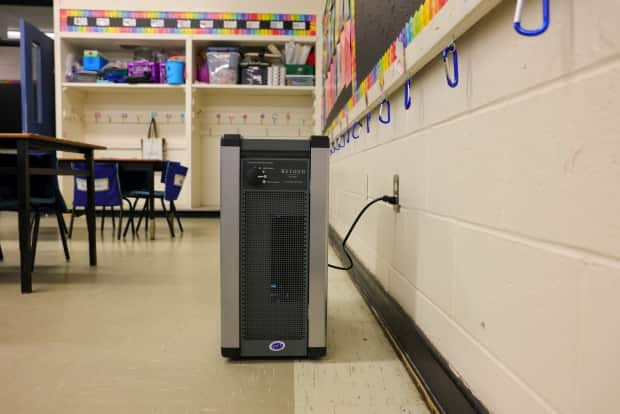Nova Scotia students return to in-person learning

After an extended winter break and a week of virtual learning because of the ongoing wave of COVID-19, Nova Scotia students returned to in-person learning on Monday.
Nova Scotia is the first Atlantic province to return to classrooms, but joined the ranks of B.C., Alberta and Saskatchewan, which reopened schools earlier this month. Ontario and Quebec classrooms also reopened Monday.
"[We] certainly understand that there's anxiety about what today was going to bring and how the next five days will play out," said Tim Simony, chair of the Public School Administrators Association of Nova Scotia.
But, he added, staff at schools and the regional centres that manage them have been working hard to make sure in-person learning will work.

Simony said his association — which represents principals, vice-principals and superintendents — has faith in Public Health's recommendations.
"We've had a lot of past success following the guidance from Public Health and, from an association perspective, [that's] why we continue to do so."
In some ways, Public Health guidance for schools is the same now as it has been in earlier waves of the pandemic. Everyone in schools is expected to wear masks except when eating, drinking or when physically active; students are to be kept in cohorts and there are to be no large gatherings such as assemblies. No non-essential visitors are allowed in schools.
No contact tracing in schools
What's changed, however, is that Public Health is no longer tracing or issuing exposure notices related to COVID-19 cases connected to schools. It's part of a broader shift in the province's COVID-19 strategy because of the prevalence of infections during this wave, which has put a strain on resources.
Public Health is now only tracing cases tied to what it has deemed as high-risk settings, including long-term care. Individuals are being encouraged to manage their own cases by following isolation guidelines and notifying their own close contacts.
Families are expected to report school absences related to COVID-19 the same way they would report any other absence; they don't have to divulge COVID-19 status. Even if a family chooses to share that information, Simony said administrators would keep it confidential as private health information.
As was already the case before COVID-19, school administrators will notify Public Health if absenteeism at a school reaches 10 per cent, at which point Public Health would investigate further.

The termination of contact tracing and public reporting of cases in schools has been a contentious point, and it's one of the reasons the Nova Scotia Teachers Union has been calling for virtual learning to continue.
Unions anticipate staffing crunch
NSTU president Paul Wozney said he expects a "gobsmacking" number of teachers to soon be absent because they're sick or isolating while they await test results. He said he expects that will lead to school closures.
"The long and short of it is we don't have enough bodies to cover off classes when teachers can't be there," Wozney told CBC Nova Scotia's Tom Murphy.
CUPE, the union that represents about 4,600 support staff in schools across the province, has called for the continuation of virtual learning for the same reason as the NSTU.
"What's the plan if there are not enough staff available to drive buses, clean schools, maintain ventilation equipment, or work with students with cognitive concerns or behavioural issues?" Lisa de Molitor, chair of the Nova Scotia Board Council of Unions at CUPE, said in a news release.
With in-person learning forging ahead, however, de Molitor said N95 masks should be provided to school staff. The Department of Education has said staff will be offered three-ply medical masks. Students are supplied with three-layer cloth masks.
Premier Tim Houston has said staffing shortages at schools will be dealt with on a case-by-case basis.
MORE TOP STORIES


